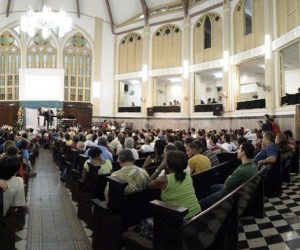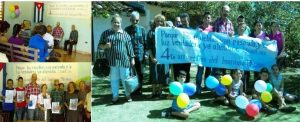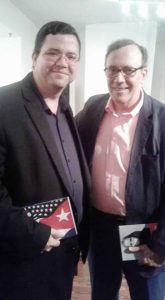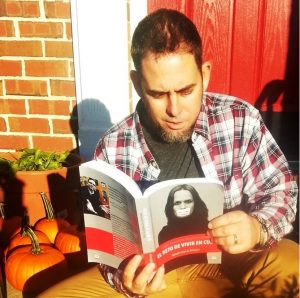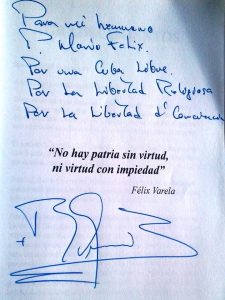In spite of the religious persecution which has been ongoing for almost six decades, first openly (before the change to the constitution in 1992), later in more covert forms during what some call a period of religious tolerance (after the constitutional change in 1992 the official state religion was changed from atheist to secular); the various religious denominations in Cuba experienced a boom in the 1990s, and have enjoyed sustained growth since then. In the present day, of the estimated 11.5 million citizens of Cuba, 35% consider themselves Catholic, 30% practice popular religions, including the four principal variants of Afro-Cuban religions and other types of Spiritism, 20% identify as atheists, and 10% as Evangelicals. The remaining 5% includes approximately 100,000 Jehovah’s Witnesses, who have been banned since 1976, 15,000 Muslims, and 1400 Jews. The Jewish community has registered the slowest growth since the great emigration of the 1960s. Of these smaller religious communities, the last group to formally declare a presence on the island was the Church of Jesus Christ of Latter Day Saints, known as Mormons, who, with the announcement of the creation of their first district in the country, planted their flag with their first 100 members after a decade of mission.
The Evangelicals, a group of 1.2 million believers which some estimate to be closer to 1.8 million if those that are not formally affiliated are considered, are the most diverse group and have the greatest potential for growth. The largest denominations are the Assemblies of God Evangelical Pentecostal Church of Cuba (Iglesia Evangélica Pentecostal de Cuba), with 500,000 believers; the Eastern Baptist Convention (Convención Bautista Oriental de Cuba), with 100,000 believers; the Methodist Church of Cuba (Iglesia Metodista de Cuba), with 70,000 believers; the Western Baptist Convention (Convención Bautista de Cuba Occidental), with 60,000 believers; the Cuban Evangelical League (Liga Evangélica de Cuba) and the Seventh-Day Adventists of Cuba (Adventistas del Séptimo Día de Cuba), with 50,000 believers each; the Open Bible (Biblia Abierta), Good News (Buenas Nuevas), and Free Baptists (Bautistas Libres), with 30,000 believers each; and the New Pines (Pinos Nuevos) with 20,000 believers. 55 denominations are included in the Ministry of Justice’s (MINJUS) registry of associations, but many others, especially those identified with neo-Evangelical movements such as the Apostolic Movement, have not been legalised. Others, such as the Baptist Berean Mission Church (Iglesia Bautista Misión Bereana), and the Jehovah’s Witnesses, have remained proscribed since 1976. These non-legally recognised groups represent 12% of the Cuban Evangelical population, they are made up of approximately 90 denominations which have appeared in Cuba over the course of the last 58 years. Some of these denominations have existed for over 30 years, it is likely that some have 30,000 members or more. Without legal recognition it is possible for the government to openly persecute them.
8% of the Evangelical population, approximately 30 denominations, are affiliated with the Cuban Council of Churches (CCC), an organisation which complies with the political system and is associated with the World Council of Churches. 80% of Evangelical denominations are associated with the World Evangelical Alliance, but their application for the legal recognition of the Cuban Evangelical Alliance has been refused. The Cuban Evangelical Alliance already exists unofficially; its primary opponent is the Office for Religious Affairs (ORA) of the Central Committee of the Cuban Communist Party, which has invalidated all attempted applications. The ORA looks unfavourably on the leaders of the denominations and tries to prevent them from holding prayer or fellowship meetings among themselves. Despite this, leaders collaborate and maintain as much contact as possible.
The situation in the six months from January to June 2017
The first six months of 2017 sadly represented a continuation of the violations of freedom of religion or belief (FoRB) which have held a consistent place in Cuba for almost six decades.
The ORA remained untouched and continued to respond to political interests, making all decisions in relation to religious affairs in Cuba. Some of its representatives and border control workforce travelled to the USA where they were received by institutions which had been previously contacted by the Cuban Embassy in Washington as guarantors of religious rights on the island. An example of this can be seen in a tweet published on 9 May by @CUBAONU, the Twitter account for the Permanent Mission of the Republic of Cuban to the United Nations. During their stay in the USA, this delegation visited religious institutions in New York which remain uninformed of the role played by the ORA in the blatant violations of FoRB in Cuba. It is likely that the objective of this delegation was to contact Mr. Ahmed Shaheed, the recently elected UN Special Rapporteur on FoRB. Our coordinators in Washington D.C. were able to contact Mr. Shaheed on 3 April 2017.
Various Cuban institutions and religious leaders have requested the creation of a Law of Worship, but this remains absent from Cuban legislation. Between January and June 2017, there was no indication that there would be advances in this area, nor was there any sign of changes in the near future if one considers the fact that the approval of a new electoral law (which has been unchanged since 1992) remains pending. Despite the fact that this was announced by state press at the beginning of 2015, a date to debate this in parliament remains unconfirmed, regardless of the fast approaching parliamentary elections, (municipal elections are due to take place on 22 October).
None of the multiple religious properties confiscated during the period of open persecution were returned in the first half of 2017; nor did any of the organisations affected receive any form of compensation. The situation regarding this violation has been static during this period, remaining unsettled without correction or compensation. There are many cases of this, but a symbolic example one could use is that of the land adjacent to the Baptist Church in Yaguajay (Calle Quintín Banderas #15, Yaguajay, Sancti Spiritus, 65100; pastored by Yuri Castellano Pérez, Emails: ycastellanos75@gmail.com, yuriyyamilka@cbcocc.co.cu, Landline: +5341553204, Mobile: +5353419904) which used to be home to a prestigious Baptist College. Despite the legal procedures undertaken by the Western Baptist Convention, the property owner, nothing has changed. This specific case irrefutably demonstrates the state’s abuse of power, not only is the land not being returned to those it belongs to, but the state has built offices on it for some of its companies, ignoring the exhaustive appeals made by members of this religious denomination.
Properties used by religious groups who haven’t received legal recognition have continued to be threatened with decommission and/or demolition. Many of these cases from the first six months of 2017 are publicly known, such as:
- King of Glory (Rey de Gloria) church, pastored by Juan Carlos Nuñez (Calle Maceo No.20, E/ J. Agüero y A. Guardia Rpto Primera, Las Tunas, Cuba, CP 751000).
- Fire and Dynamism (Fuego y Dinámica) church, pastored by Bernardo de Quesada in Camagüey (Email: bernardo65@nauta.cu, bernardoquesada@yahoo.es, Mobile: +5352931429, +5353135111, Landline: +5332213034).
- Paths of Justice (Sendas de Justicia) church, pastored by Alain Toledano Valiente in Santiago de Cuba (Email: alaintoledano2007@gmail.com, Mobile: +5353388566)
- Strong Winds (Viento Recio) church, pastored by Mario Travieso in Las Tunas (Email: adri6409@nauta.cu, Mobile: +5353949392).
- Establishing the Kingdom of God (Estableciendo el Reino de Dios) church, pastored by Marcos Antonio Perdomo Silva in Santiago de Cuba (Email: pastormarcos60@gmail.com, Mobile: +5353630754).
- The Baptist Berean Mission Church (Iglesia Bautista Misión Bereana) church, pastored by Daniel Josué Pérez Naranjo (Arroyón, Chaparra, Las Tunas, Email: josuedaniel88@nautu.cu, Mobile: +5353137732, +5352225874).
Many of these had already suffered violations in past months, but new attacks can occur at any moment. Many other pastors, including those of legally recognised churches, report similar threats but have asked to remain anonymous for fear of greater reprisals.
The first half of 2017 also showed no sign of the recognition of some of the religious organisations, including those mentioned above, that had requested legal inscription from the MINJUS Registry of Associations. Some of these organisations have been waiting for this for decades. These unrecognised groups report the greatest number and widest range of violations of FoRB, as the legal ‘limbo’ they find themselves in prevents them from enjoying impunity.
The CCC has a 20 minute radio programme ‘Evangelism on the March’ (El Evangelio en Marcha) which is transmitted exclusively on CMBF Radio Musical Nacional on the first Sunday of every month at 8am. The regime uses this to claim that Cuban religious organisations have access to the media, however, apart from this programme, no other space has been given to religious organisations on radio or television, which are under exclusive state monopolies.
Education has remained completely in state hands over the past six months; religious groups have not been permitted to open any schools at any levels of education, including preschools and kindergartens. This constitutes a blatant and ongoing violation of the rights of thousands of families who would prefer to send their children to non-state schools and colleges, as state schools use educational programmes and subjects which contradict the teachings and principles of religious organisations. Teaching in state schools can often be ideological or politicised. This also constitutes a violation for religious organisations who are in the position to contribute to Cuban society by providing educational institutions but are refused the right to do so.
In relation to this violation, one pastor in eastern Cuba received reprisals after he chose to act against the system. This case is ongoing and refers to Pastor Ramón Rigal who resides in Guantánamo (Church of God in Christ (Iglesia de Dios en Cristo), Calle Luz Caballero #1075, entre Mármol y Varona, Guantánamo; Email: ramonrigal@nauta.cu, Mobile: +5358551607). This religious leader, representing the feelings of millions of Cuban parents, decided to home-school his children with support from prestigious institutions such as the Home School Legal Defense Association in the USA. For this reason, the pastor and his wife Adya were arrested on 21 February and accused of “acting against the normal development of a minor”. Later, on 25 April, they were put on trial without guarantees and Pastor Rigal was sentenced to a year in prison and his wife to a year of house arrest. The final decision will be given at an oral hearing on 6 July as a response to the pastor’s appeal.
In the first six months of this year, cases of students and professors being excluded from university premises for religious or political reasons have been reported. One well-known and documented case is that of the expulsion of Dalila Rodríguez González for religious reasons (Email: dalilarod83@gmail.com, Mobile: +5353236152). Dalila is an active youth leader at the Good News church associated with the Calvary Chapel in Camajuaní. After over ten years of successful work, this brilliant young woman, who is only 33 years old, was disqualified as a professor and suspended from the doctorate she was studying. On 11 April, Dalila was dismissed from her position in the Faculty of Humanities by the rector, Andrés Castro Alegría. The rector invoked article 74 of the regulation for the application of teachers of higher education. On 2 June, the Ministry for Higher Education ratified this decision in response to an appeal Dalila had made with the help of a lawyer.
With further regard to education in the first half of the year, the Ministry for Higher Education continued to refuse to recognise all biblical and theological seminaries in the country, despite the fact that they have been recognised by their associations. There are also no theological faculties in any of the universities in Cuba. While this affects all theological seminaries, a symbolic case one could refer to is that of the Cuban University of Pentecostal Theology (Universidad Teológica Pentecostal de Cuba), which belongs to the Assemblies of God church and was founded in 1939. The university’s buildings were confiscated in 1963, despite this, the university has created an education system on 17 campuses (affiliated campuses or centres of theological studies) across all provinces in Cuba. In the present day, the university is involved in the training of approximately 7000 pastors with great interdenominational influence. A more recent example one could refer to is that of the Luis Manuel González Peña Baptist Theological Seminary which is owned by the Trinity Baptist Church of Santa Clara. Both of these institutions are recognised by the Caribbean Evangelical Theological Association, which is linked to the International Council for Evangelical Theological Education, however their requests for accreditation from the Ministry for Higher Education have been repeatedly refused.
The Jehovah’s Witnesses have also been the object of attention in the first half of 2017, who were declared illegal in Russia on 20 April by the Supreme Court after an intense legal battle. This brought to mind the vicissitudes this same group suffered in Cuba in 1976. Since then, the idea of identifying their places of worship with a ‘Kingdom Hall’ sign has been unthinkable, even though this would be normal in any country with respect for religious freedoms. Other organisations were also proscribed in 1976, such as the Baptist Berean Mission Church, and have remained in the same legal state during the past six months as they have for over 40 years.
On every Sunday of 2017, the women’s group known as the Ladies in White (Damas de Blanco) have been prevented from attending mass. This is a continuation of the same from 2016. There have now been a total of 105 Sundays on which these violations have taken place. The women belonging to this group are arrested, often in a violent way, as they leave their houses, which are under constant surveillance, or at some point before arriving at their churches. This constitutes one of the largest violations of FoRB that has been ongoing throughout the entire first half of the year and deserves complete attention and condemnation from international organisations that work for religious freedom. Some of the representatives of the Ladies in White, including their leader, Berta Soler, have been prevented from leaving Cuba on various occasions in the past six months. On 5 June, Sayli Navarro, a young Catholic who is a member of the Ladies in White, was prevented from boarding a plane to Brussels where she was going to condemn violations such as these in front of European Parliament. She had been invited by the Alliance of Liberals and Democrats for Europe.
Religious repression in Cuba prioritises those that try and live by their faith in the political arena, national and international organisations that specialise in violations of FoRB should take this category into account and consider cases such as that of Pastor Joanna Colombie Grave de Peralta (Emails: joannacolumbie@yahoo.es, joannacolumbie@nautu.cu, Mobile: +5354247379). Pastor Peralta is a graduate of the Evangelical Theological Seminary of Matanzas; she has an independent church which meets in her own home in Céspedes, Camagüey, and has been the object of a wide range of censorship in the past. Her decision to practice leadership at Academia 1010, organised by the movement Somos + due to her commitment to her Christian faith resulted in her being arbitrarily detained on numerous occasions. This also led to her being held in a cell in Vivas prison for 8 days (from Friday 26 May to Friday 2 June). After this she was humiliatingly deported within her own country, from La Habana to Camagüey, and threatened with judicial prosecution if she attempt to return to the capital. Pastor Peralta has also been prevented from flying out of Cuba on various occasions this year, the most recent of which was on 17 June when she attempted to travel to Peru.
The ORA also considers brotherhoods to be religious associations in Cuba, such as the freemasons, All Fellows, and Gentlemen of the Light. For this reason, the Patmos Institute is committed to paying attention to violations that these institutions suffer as well. An example of this was reported by the mason Armando Antonio Pérez Pérez, who leads the ‘Urania – Dr. Mortera’ Masonic Lodge in Zulueta, Villa Clara. Mr. Pérez Pérez reports constant censorship and limitations to his work in his lodge. (Emails: armandoantonio.perez@nauta.cu, amandaamalia0103@gmail.com, Mobile: +5353502039).
Other situations which took place in 2016 that the Patmos Institute finds highly concerning are:
- The abuse of the Centre of Co-existence Studies (Centro de Estudios Conviviencia), a Catholic organisation directed by the well-known layman Dagoberto Valdés (Emails: dagoberto@convivienciacuba.es, dagocuba@nauta.cu, Mobile: +5352636146) whose headquarters, the home of Karina Gálvez, remains occupied. The members of this centre, including Dagoberto and Karina, have been subject to constant citations and threatened with pre-arrest warrants in military units.
- The imprisonment of the active Catholic layman Dr. Eduardo Cardet Concepción, leader of the Christian Liberation Movement and resident of Velasco, Holguín (Mobile: +5353192883). He was sentenced to three years in prison for his leadership of the movement and for his Christian inspirations. Amnesty International have declared him a prisoner of conscience.
Many other cases were reported during the first half of 2017 and can be clearly classified as violations of FoRB within Cuba. Some are similar to the situations described in this report, others take different forms, but their victims have requested that these cases are not made public at present for fear of greater repression, which many have been threatened with, or to protect other people or institutions in general. Nonetheless, the Patmos Institute possesses the information and does not rule out the possibility of sharing it in private with organisations that defend human rights that promise not to publish it until the necessary authorisation is given by those involved.
Conclusion
According to the above evidence, which is not exhaustive, religious freedoms remain the object of a wide range of violations, as do the other civil rights of Cubans. These violations continue to take similar forms despite the death of Fidel Castro, the election of Donald Trump and his recent speech on Cuba on 16 June which announced a change in the politics of the US government, the Venezuelan crisis, and the approaching 2018 elections, which will be controlled.
Perhaps the greatest evidence of all of these violations it the widespread fear which can be observed in legally recognised groups and in those that are not registered but are still relatively well tolerated. Although this sentiment may not apply to all religious groups under totalitarianism, reactions such as these in the interest of the survival and preservation of small spaces and concessions are repeatedly observed in totalitarian regimes. This has the effect of silencing reports of the blatant violations suffered in the places people are ministering in. Those that don’t practice self-censorship and remain faithful to the values of their religions as antidotes to their fear receive the same treatment as political dissidents and are accused by the regime of interfering in politics, as though it is not politics that is directly responsible for reducing their freedom.
These are not isolated cases, as suggested in the Associated Press report ‘Far from the dark past, Evangelicals grow in Cuba’ (Lejos del pasado oscuro, evangélicos crecen en Cuba) written by Andrea Rodríguez on 27 March. The source for this report was Joel Ortega Dópico, the president of the CCC, an organisation which has historically been a staunch supporter of the system. In reality, it seems that the situation for all Cuban religions can be summarised in two sad words: self-repression or repression.
Note: The organisation which authored this report, the Patmos Institute, was founded in Cuba on 2 February 2013. One of its primary objectives is to monitor religious freedoms in Cuba, because of this, the organisation itself has suffered reprisals for trying to bring violations such as those reported to light. Leonardo Rodríguez Alonso, the institute’s founder and co-ordinator for central Cuba, has been subject to pressures, arrests and threats. Dalila Rodríguez González, his daughter, is mentioned in this report, demonstrating the abuse his family is subjected to. Similarly, Félix Llerena López, the co-ordinator for Western Cuba, was expelled from his studies at the University of Pedagogical Sciences in May, and was prevented from leaving the island on 17 June. Raudel García Bringas, a co-ordinator based in Miami, was welcomed to the US under the Cuban Adjustment Act, after spending three years in prison in Cuba (his testimony can be found in his book ‘Entre la aceptación y el rechazo: El reto de vivir en Cuba’, which is available on Amazon: ttp://amzn.to/2tgAnhb . The founders of the Institute, the missionary Yoaxis Marcheco Suárez and Baptist pastor Mario Félix Lleonart, both of whom are general co-ordinators, were received as refugees by the US government, in response to the high levels of repression they were faced with (their testimonies are available in their books, ‘Isla Interior’ and ‘Cubano Confesante’, published by Neo Club Ediciones and also available on Amazon: http://amzn.to/2ugjSpx and http://amzn.to/2ugmVxH).
- Patmos Institute: institutopatmos@gmail.com
- Blog: institutopatmos.wordpress.com
- Twitter: @ForoPatmos
- P. O. Box 65378, Washington DC, 20035-5378
- Washington D.C., 5 July 2017

